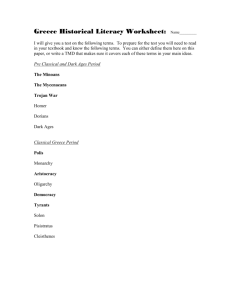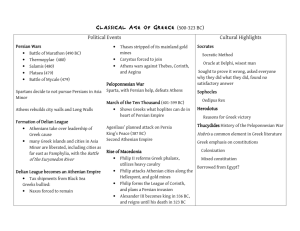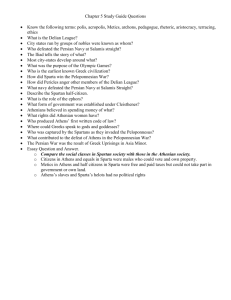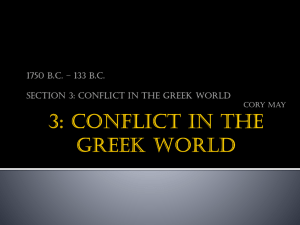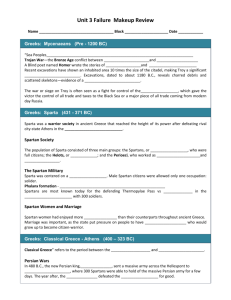fifth century timeline and supplementary information
advertisement
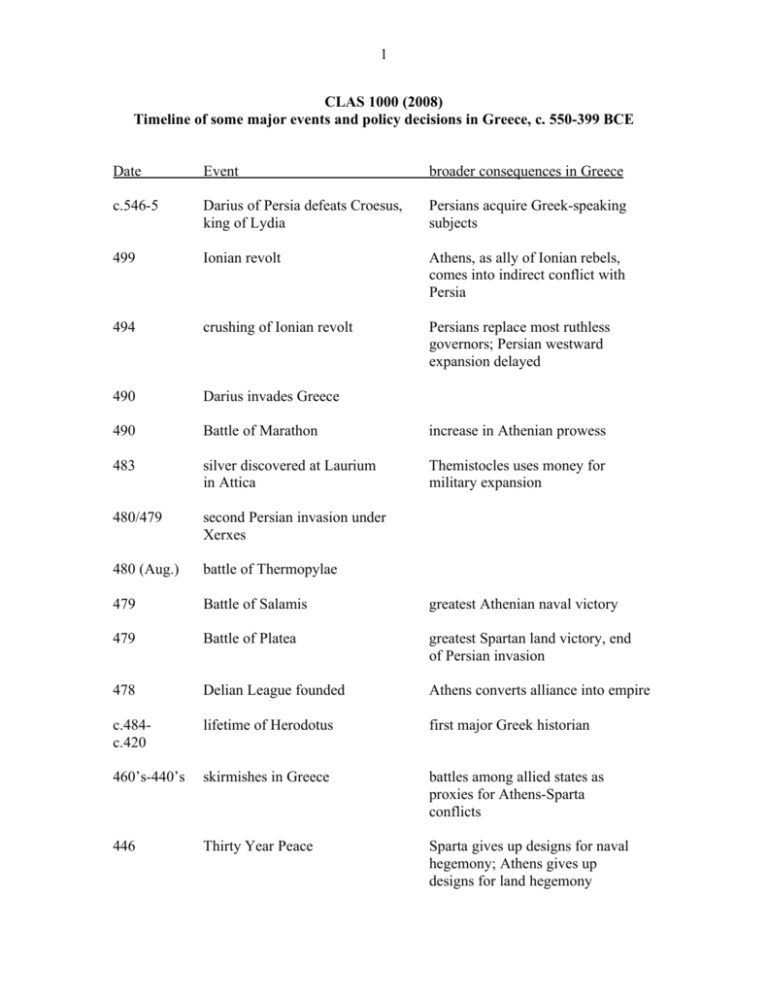
1 CLAS 1000 (2008) Timeline of some major events and policy decisions in Greece, c. 550-399 BCE Date Event broader consequences in Greece c.546-5 Darius of Persia defeats Croesus, king of Lydia Persians acquire Greek-speaking subjects 499 Ionian revolt Athens, as ally of Ionian rebels, comes into indirect conflict with Persia 494 crushing of Ionian revolt Persians replace most ruthless governors; Persian westward expansion delayed 490 Darius invades Greece 490 Battle of Marathon increase in Athenian prowess 483 silver discovered at Laurium in Attica Themistocles uses money for military expansion 480/479 second Persian invasion under Xerxes 480 (Aug.) battle of Thermopylae 479 Battle of Salamis greatest Athenian naval victory 479 Battle of Platea greatest Spartan land victory, end of Persian invasion 478 Delian League founded Athens converts alliance into empire c.484c.420 lifetime of Herodotus first major Greek historian 460’s-440’s skirmishes in Greece battles among allied states as proxies for Athens-Sparta conflicts 446 Thirty Year Peace Sparta gives up designs for naval hegemony; Athens gives up designs for land hegemony 2 451/50 Athenian citizenship law increased status of Athenian women; citizen group solidified 447-432 Parthenon rebuilt, along with other Acropolis buildings imperial funds spent on Athens; increasing resentment of allies 454 treasury of Delian League moved to Athens primacy of Athens solidified; increasing resentment of allies 454-3 and 434-3 extant portions of tribute lists amounts show 1/60 of tribute paid by allies to Athens 431 Peloponnesian War begins 430 “plague” at Athens Attica loses up to 30% of population, including Pericles 427 Spartans send fleet to Mytilene, Athenians debate Mytiline is spared at last minute 421 Peace of Nicias (after armistice of 423) conclusion of first part of war, essentially a stalemate 416/5 Athenian destruction of Melos, neutral Dorian colony sign of moral decline (Thucydides), increases resentment toward Athens 415 mutilation of the herms Alcibiades flees Athens 415-413 Sicilian Expedition catastrophic Athenian defeat 413-404 Spartan garrison at Decelea Spartan base in Attica allows incursions 411 oligarchic coup at Athens 410 restoration of Athenian democracy 404 Athenian defeat at Aegospotami end of Peloponnesian War and Athenian Empire 404 coup of the Thirty at Athens reign of terror 403 restoration of Athenian democracy under Spartan leader Pausanias 3 399 trial of Socrates Socrates forced to drink hemlock c.455c.400 lifetime of Thucydides second major Greek history major figures in sixth and fifth century Greek history (mostly covered by Sowerby) Solon Cleisthenes Croesus Darius I Histiaeus Xerxes Mardonius Themistocles Demaratus Aristides (“the just”) Ephialtes Pericles Cleon (leading Athenian politician after death of Pericles) Nicias (leading Athenian politician and general after death of Pericles; known for moderate approach to war and military intervention, but sent to lead Sicilian Expedition) Alcibiades Lysander (Spartan general who took command at Athens after their defeat in 404) some important terminology • • • stasis: Greek word meaning “faction,” “civil discord,” “internal revolt” hubris (also spelled “hybris”): a word which appears in both Greek and English. It refers to a sense of superiority and insolence which leads to destruction (ate [pronounced AHH-tey] in Greek). An exploration of hubris is an important part of the work of Herodotus as well as Greek tragedy, especially Aeschylus. pentecontaetia: means “fifty years,” used in reference to fifty-year span between the Persian and Peloponnesian wars, and also in reference to Thucydides’ discussion of the period. An entirely idiosyncratic and personal choice of passages of Herodotus and Thucydides: Book I.1ff. of each writer: justification of each for writing history. Particularly telling about methodology and the belief of each in the importance of their subject matter. The construction of speeches in Thucydides (a combination of working from memory and recreating “what should have been said on each occasion”) is highly controversial to this day. 4 Book I of Herodotus: although even the Greeks had problems with some aspects of this book (Solon and Croesus could not have met because of the chronology), it is a masterpiece of ethnographic (i.e., anthropological) and psychological understanding, particularly about Croesus. The book is also fascinating for its depiction of events of sufficient interest to contemporary Greeks that they portrayed them in art. Examples of these include Cleobis and Biton, statues of whom are in the archaeological museum in Delphi, and vase painting of Croesus on the pyre. Book IX of Herodotus: tale of the Persian defeat. Overview of Herodotus: conceptions of hubris in history and tragedy. If at all possible, the reader should compare Herodotus’ take on the Persians with that of Aeschylus in his tragedy The Persians. Thucydides II.34-46: Pericles’ funeral oration and his description of the “plague” at Athens, which follows immediately (II.47-55) Book III of Thucydides (III.37-49): debate over Mytilene, in comparison with end of Book V (V.84-116), “the Melian dialogue.” Books VI and VII, the Sicilian expedition, are worth reading as a separate work. Finally, the reader should look at Thucydides’ account of the oligarchic coup in Athens in 411/410 BCE. at VIII.47-98.



